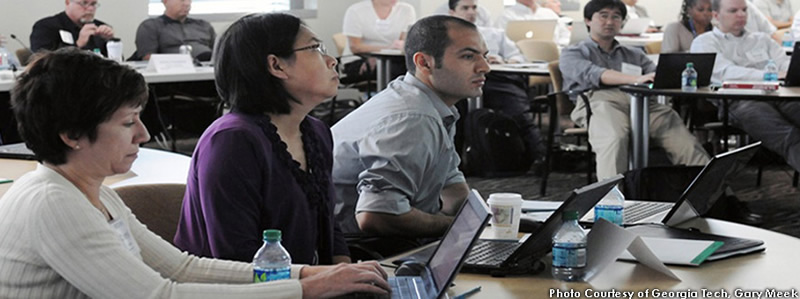The Center for Technology Commercialization (CTC) recently wrapped up its second consecutive year of mentoring a team from UW-Madison through the National Science Foundation Innovation Corps (iCorps) program, an intensive seven-week program created in 2012 to improve the commercial successes of NSF-funded technology and to expedite the start-up process.
iCorps provides each competitively assembled team with a $50,000 grant and the opportunity to determine whether a technology is commercially viable. Each team is comprised of a post doctorate or graduate student as the Entrepreneurial Lead, a Mentor – typically a seasoned entrepreneur – and a Principal Investigator – typically a faculty member.
The 2013 UW-Madison team consisted of CTC Consultant David Linz as Mentor, along with Entrepreneurial Lead Sean Larson, and Principal Investigator Dr. Leyuan Shi. The team focused on LS Optimal manufacturing scheduling technology.
The teams participate in the iCorps Lean LaunchPad curriculum designed by renowned serial entrepreneur, Steven Blank. The Lean LaunchPad approach is unique in that it emphasizes the role of the customer in bringing an abstract technology to market. “Lean LaunchPad uses the Business Model Canvas as a framework to do customer development. It is the fastest and most efficient way to identify a profitable and scalable business model upon which to start a successful business,” says Linz, who notes that CTC has adopted the same approach in consulting with its clients.
This customer-focused approach alters the way entrepreneurs think about technology commercialization. “I-Corps really changed me,” notes Larson. “I now see technology and innovation in a completely different light. As an engineer, I am normally tinkering with things or thinking of ideas. But before I would say to myself, ‘that is neat, I wish someone would make it.’ Now I say, ‘Are there others like me who want this? How many? Do they want to pay? Does it solve a problem?’ It really has completely shifted how I see and interact with the world.”
Dr. Alireza Javadi, 2012 iCorps team Lead, also calls the iCorp experience life changing. “It completely changed the point of view I have towards science and technology. Through iCorps I got to solve real life problems, to practice how I can transfer my technology to a business and to see whether it would be a viable business or not,” says Javadi. “I still use the knowledge I gained through iCorps on a daily basis.”
CTC acting Director Cheryl Vickroy, who served as a mentor on the iCorps 2012 team, champions the methodologies utilized in the iCorps program. Vickroy notes, “The lean startup methods used in iCorps are best done as a team, with expert guidance, someone to use as a sounding board or a guide through the process. That is where we come in. We work with entrepreneurs to round out their team.”
The goal of iCorps is to turn out 1,000 people nationwide with these lean startup skills over a two to three-year period. Vickroy adds, “The whole program is designed to figure out if a technology with potential commercial application is a ‘go’ or ‘no go’ as quickly as possible. Essentially, the process reduces the risk of market acceptance for an idea or innovation. Participants gain tremendous skills from this. If they don’t apply it to their technology, they will apply it to another technology that they develop in the future.”

UW-Madison NSF iCorp Team as they listen to a presentation held at Georgia Institute of Technology. From left: Cheryl Vickroy, Mentor; Dr. Sarah Gong, Principal Investigator; and Dr. Alireza Javadi, Entrepreneurial Lead.
